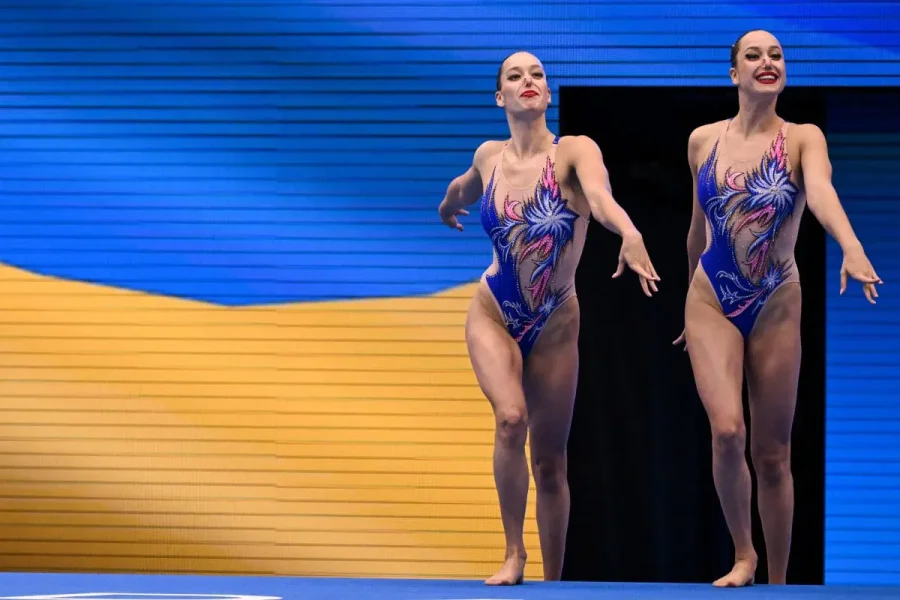As synchronised swimmers, Maryna and Vladyslava Aleksiiva are used to having to smile no matter what.
The sunny sisters are one of Ukraine’s best hopes of a gold medal at the Paris Olympics after winning a bronze in artistic swimming at the Tokyo Games three years ago.
But the trials the 22-year-old twins have been put through — forced to flee their homes, surviving shelling and sleeping in bomb shelters — have tested even their stoicism.
They have even had to jump out of the pool and “run to the basement in wet swimsuits” when the explosions got too close, Maryna told AFP.
Russian tanks were stopped in the suburbs of their hometown Kharkiv during the invasion almost two years ago, with the sisters having to leave their sparkly costumes behind when they were evacuated.
Regular bombardments have not stopped them from returning to Kharkiv to prepare for the Games, even if the windows of their training pool are still broken from the missile attacks the border city is often subjected to.
“Everything has been bombed: our pool, where we started training, our school, our city centre,” added Maryna.
While the Ukrainian army eventually pushed the Russian troops back, Kharkiv is still vulnerable, only 30 kilometres (19 miles) from the border. Last week, 11 people were killed in the latest wave of Russian missile attacks on the city.
It is not exactly the ideal environment for elite swimmers to go for gold, especially when there is no generator to warm the water when the power fails, as it often did last year after the country’s electricity grid took a pounding from the Russians.
AFP has been following the sisters on their turbulent path to Paris, an odyssey that has taken them from Kharkiv to Italy, France, Poland, Spain, Japan and back.
“When the war started, we did not know what to do,” said Vladyslava, the shyer of the two, who often lets her twin Maryna finish her sentences.
“But then we understood our main goal could be to show courage all over the world in competitions.” “To show Ukraine is still alive,” Maryna added. “We must show strength.”
With the Russians threatening to take the city in the early days of the war, the sisters fled Kharkiv with the rest of Ukraine’s artistic swimming team and trained in Italy for six months.
But they were determined to go back to Ukraine to be closer to their parents, training in Kyiv and “sleeping at night in the corridor of a bomb shelter” before returning to Kharkiv.
They have not left their home city — the heart of Ukraine’s artistic swimming scene — since then, except for short trips abroad to compete.
Even if it is more dangerous, “it’s much better to be together, (even) without electricity and music to train,” Vladyslava told AFP during a break in the World Aquatics World Cup in France in May where they won the duet gold.
They visited Montpellier’s historic centre to eat ice cream and post stories on Instagram to celebrate.
But even in those carefree moments when they joked about the joys of having electricity, the war was never far away.
“I called Mum yesterday, but it was an air raid alert and I was a little bit nervous,” said Maryna at the time. “Mum and Dad said, ‘Don’t worry, we’re fine.’ So we tried to keep calm and concentrate on our competition.”
When we caught up with the twins again in July at the World Aquatics Championships in Fukuoka, Japan, they struck an even more sombre note.
“It is hard to focus when your country is at war and you are away from family,” Vladyslava admitted.
“We have friends who are sportsmen who died on the battlefield defending our country… it is an awful time for us.”
Yet back on their sofa in Kharkiv on a rare day off in November, they did not turn a hair when the air raid siren sounded, even though Maryna’s apartment is on the top floor and more exposed to shelling.
The sirens go off “five or six times every day” she said. “At night also. It’s normal.”
Every morning they read the news to see if it’s safe to train, only going to the bomb shelter when it’s really dangerous.
Vladyslava lives next door with her husband, an IT specialist, which is handy because “we always swap clothes, handbags, jackets, shoes,” said Maryna.—AFP









